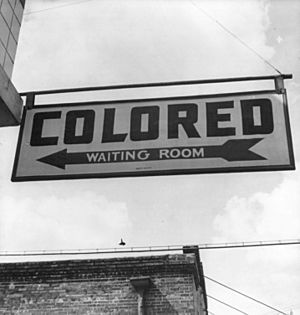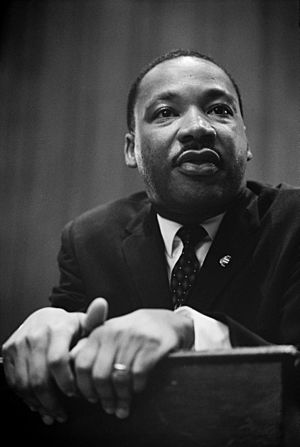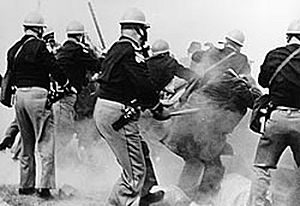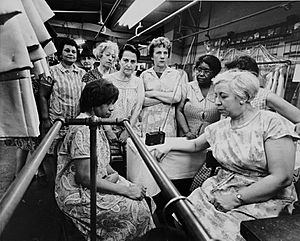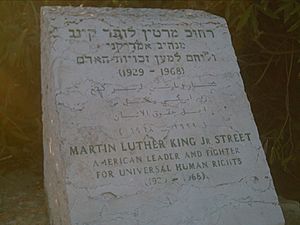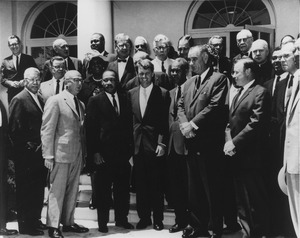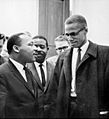Martin Luther King Jr. facts for kids
Quick facts for kids
Martin Luther King Jr.
|
|
|---|---|
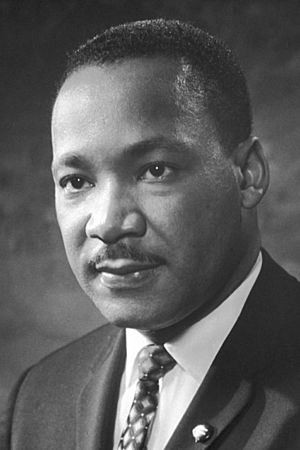 |
|
| 1st President of the Southern Christian Leadership Conference | |
| In office January 10, 1957 – April 4, 1968 |
|
| Preceded by | Position established |
| Succeeded by | Ralph Abernathy |
| Personal details | |
| Born |
Michael King Jr.
January 15, 1929 Atlanta, Georgia, U.S. |
| Died | April 4, 1968 (aged 39) Memphis, Tennessee, U.S. |
| Cause of death | Gunshot wound |
|
Buried
|
|
| Spouse | |
| Children | Yolanda Martin Dexter Bernice |
| Parents | Martin Luther King Sr. Alberta Williams King |
| Relatives | Christine King Farris (sister) Alfred Daniel Williams King (brother) Alveda King (niece) |
| Education | Morehouse College (BA) Crozer Theological Seminary (BDiv) Boston University (PhD) |
| Occupation | Minister, activist |
| Known for | Civil Rights Movement, Peace movement |
| Awards | Nobel Peace Prize (1964) Presidential Medal of Freedom (1977, posthumous) Congressional Gold Medal (2004, posthumous) |
| Monuments | Martin Luther King Jr. Memorial |
| Signature | |
Martin Luther King, Jr. (born Michael King, Jr.; January 15, 1929 – April 4, 1968) was an American pastor and activist. He was a very important leader in the Civil Rights Movement. He is famous for helping to improve civil rights for all people. He did this by using nonviolent civil disobedience. This means he protested unfair laws peacefully, based on his Christian beliefs.
Because he had a Ph.D. and was a pastor, people often called him the Reverend Doctor Martin Luther King Jr. or just Dr. King. His initials, MLK, are also well-known.
Dr. King worked hard to make sure everyone, no matter their race, was treated fairly. He gave many speeches to encourage African Americans to protest without using violence.
With Dr. King's leadership, many African Americans used peaceful ways to fight for their rights. They did things like sit-ins, boycotts, and protest marches. Sometimes, they were attacked by police or others who did not want them to have equal rights. But Dr. King and his followers never fought back.
King also helped organize the 1963 March on Washington for Jobs and Freedom. There, he gave his famous "I Have a Dream" speech. The next year, he won the Nobel Peace Prize.
Dr. King fought for equal rights from the start of the Montgomery Bus Boycott in 1955. He continued his work until he was murdered by James Earl Ray in April 1968.
Contents
Early Life and Challenges
Martin Luther King was born in Atlanta, Georgia, on January 15, 1929. His parents were Michael King Sr. and Alberta Williams King.
When King was growing up, many public places in Georgia were segregated. This meant black and white people had to use separate schools, bathrooms, restaurants, and even hospitals. The places for white people were usually much better.
King first experienced discrimination when he was six years old. He went to an all-black school, while his white friend went to an all-white school. Later, at age fourteen, King won a speech contest about civil rights. On the bus ride home, he was told to give up his seat for a white person. Even buses were segregated. King later said this made him "the angriest I've ever been."
His Name Change
At birth, Martin Luther King was named Michael King, just like his father. In 1934, his father, Michael King Sr., changed his own name to Martin Luther King. He did this to honor German reformer Martin Luther. His father also unofficially changed his son's name to Martin Luther King Jr.
On King's birth certificate, "Michael" was crossed out. "Martin Luther Jr." was neatly written next to it. However, his birth certificate was not officially changed until July 23, 1957. At that time, he was 28 years old.
Early Interests and Talents
Martin King Jr. loved music and reading from a young age. By age five, he had memorized many hymns and Bible verses. From age six, he sang hymns at church events while his mother played the piano. His favorite hymn was "I Want to Be More and More Like Jesus."
King also enjoyed opera and played the piano. He learned many new words by reading dictionaries. He sometimes got into fights with other boys, but he often used his knowledge of words to avoid or stop arguments.
In 1939, King sang in his church choir. He was dressed as a slave for an all-white audience. This was at the Atlanta premiere of the movie Gone with the Wind. In 1940, at age 11, King started seventh grade at the Atlanta University Laboratory School. There, he took violin and piano lessons. He also showed a strong interest in history and English classes.
His Education Journey
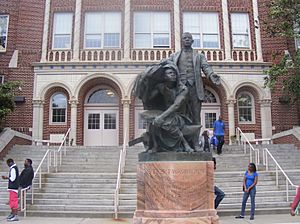
King went to segregated schools in Georgia. He finished high school early, at age fifteen. He then went to Morehouse College in Georgia, where his father and grandfather had also studied.
After graduating from college in 1948, King wasn't sure what he wanted to do. He thought about becoming a doctor or a lawyer. But he decided to join the Baptist Church instead.
King went to a seminary in Pennsylvania to become a pastor. While studying there, he learned about Mahatma Gandhi's non-violent methods. Gandhi had used these methods to protest against the British Empire in India. King became convinced that these non-violent ways would be very helpful for the civil rights movement in America.
Finally, in 1955, King earned his Ph.D. from Boston University's School of Theology.
Leading the Civil Rights Movement
The Montgomery Bus Boycott
King started his civil rights activism in 1955. He led a protest against the way black people were segregated on buses. Dr. King taught everyone that problems should be solved using only peaceful methods.
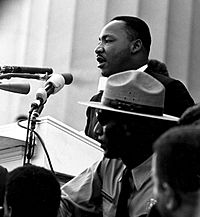
A group of activists formed the Montgomery Improvement Association (MIA). They chose King as their president. Rosa Parks later said they chose him because he was new to the community and didn't have any enemies. King became a very important leader of the boycott. He became famous across the country, but he also made many enemies. By December 1956, segregation on Montgomery's buses ended. People could sit anywhere they wanted.
After the bus boycott, King and Ralph Abernathy started the Southern Christian Leadership Conference (SCLC). This group decided to use only non-violence. Their motto was: "Not one hair of one head of one person should be harmed." The SCLC chose King as its president.
The March on Washington
In 1963, King helped organize the March on Washington for Jobs and Freedom. This was the largest protest for human rights in United States history. On August 28, 1963, about 250,000 people marched from the Washington Monument to the Lincoln Memorial. They listened to civil rights leaders speak. King was the last speaker.
His speech, called "I Have a Dream," became one of the most famous civil rights speeches ever. King spoke about his dream that one day, all people would be equal.
That same year, the United States government passed the Civil Rights Act. This law made many types of discrimination against black people illegal. The March on Washington showed the government that they needed to act on civil rights. It helped get the Civil Rights Act passed.
Winning the Nobel Peace Prize
In 1964, King received the Nobel Peace Prize. When he was given the award, the Chairman of the Nobel Committee said: [King] is the first person in the Western world to have shown us that a struggle can be waged without violence. He is the first to make the message of brotherly love a reality in the course of his struggle, and he has brought this message to all men, to all nations and races.
Fighting for Voting Rights
King and many others then started working on the problem of racism in voting. At that time, many Southern states had laws that made it hard for African Americans to vote. For example, they had to pay extra taxes, pass reading tests, or pass tests about the Constitution. White people did not have to do these things.
In January 1965, civil rights groups in Selma, Alabama, asked Dr. King and the SCLC for help. They wanted to work on voting rights in their county. The SCLC decided to organize a march from Selma to Montgomery. By walking 54 miles (87 kilometers) to the state capital, activists hoped to show how much African Americans wanted to vote. They also wanted to show that they would not let racism or violence stop them.
The first march was on March 7, 1965. Police officers and others attacked the marchers with clubs and tear gas. Seventeen marchers had to go to the hospital, and 50 others were injured. This day became known as Bloody Sunday. Pictures and film of the marchers being beaten were shown around the world. Seeing these images made more people support the civil rights activists. People came from all over the United States to march with them.
Finally, President Lyndon B. Johnson sent soldiers from the United States Army and the Alabama National Guard to protect the marchers. From March 21 to March 25, the marchers walked from Selma to Montgomery. Led by King and other leaders, 25,000 people entered Montgomery on March 25. King gave a speech called "How Long? Not Long" at the Alabama State Capitol. He told the marchers that it would not be long before they had equal rights.
On August 6, 1965, the United States passed the Voting Rights Act. This law made it illegal to stop someone from voting because of their race.
Later Work and Campaigns
After these victories, King continued to fight against poverty. He also spoke out against the Vietnam War.
His Assassination
King had made enemies because he was such a powerful leader for civil rights. The Ku Klux Klan tried to hurt King's reputation. The Federal Bureau of Investigation (FBI) watched King closely. They listened to his phones and his home, and the phones and homes of his friends.
On April 4, 1968, King was in Memphis, Tennessee. He planned to lead a protest march to support garbage workers who were on strike. At 6:01 pm, King was shot while standing on the balcony of his motel room.
King was rushed to St. Joseph's Hospital. His heart had stopped. Doctors tried to save him, but they could not. He died at 7:05 p.m.
King's death led to riots in many cities across the United States.
In March 1969, James Earl Ray was found guilty of killing King. He was sentenced to 99 years in prison. Ray died in 1998.
His Lasting Legacy
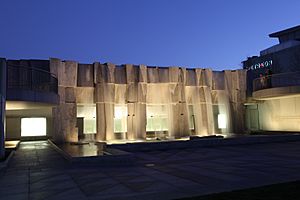
Just days after King's death, Congress passed the Civil Rights Act of 1968. This law, also called the Fair Housing Act, made it illegal to discriminate in housing. This meant people could not be stopped from buying or renting a home because of their race, religion, or home country. This law was seen as a tribute to King's work fighting housing discrimination.
After his death, King was given the Presidential Medal of Freedom. King and his wife were also awarded the Congressional Gold Medal.
In 1986, the United States government created a national holiday to honor King. It is called Martin Luther King Jr. Day. It is celebrated on the third Monday in January, around the time of King's birthday. Many people worked hard to create this holiday, including singer Stevie Wonder.
In 2003, the United States Congress passed a law allowing the first words of King's "I Have a Dream" speech to be carved into the Lincoln Memorial.
King County in the state of Washington, is now named after MLK. It was originally named after William R. King, a politician who owned slaves. In 2005, the King County government decided the county would now be named after Martin Luther King, Jr. Two years later, they changed their official logo to include a picture of King.
More than 900 streets in the United States have also been named after King. These streets are in 40 different states, Washington, D.C., and Puerto Rico.
In 2011, a memorial statue of King was put up in West Potomac Park next to the National Mall in Washington, D.C..
There are also memorials for King around the world. These include:
- The Reverend Martin Luther King, Jr. Church in Hungary;
- The King-Luthuli Transformation Center in Johannesburg, South Africa;
- The Rev. Martin Luther King, Jr. Forest in Israel's Southern Galilee area;
- The Martin Luther King, Jr. School in Accra, Ghana;
- The Gandhi-King Plaza (garden), at the India International Center in New Delhi, India;
- A statue of King at Westminster Abbey in London; and
- A statue dedicated to Martin Luther King Jr. in Uppsala, Sweden.
Inspiring Quotes from Martin Luther King Jr.
- "Life’s most persistent and urgent question is, 'What are you doing for others?'"
- "[After I die,] I'd like somebody to mention that day that Martin Luther King Jr. tried to give his life serving others."
- "The ultimate measure of a man is not where he stands in moments of comfort and convenience, but where he stands at times of challenge and controversy."
- “The time is always right to do what is right.”
- “Darkness cannot drive out darkness; only light can do that. Hate cannot drive out hate; only love can do that.”
- “Forgiveness is not an occasional act. It is a permanent attitude.”
- “We must learn to live together as brothers or perish together as fools.”
- “Faith is taking the first step even when you don’t see the whole staircase.”
- “Let no man pull you so low as to hate him.”
- "I submit to you that if a man has not discovered something that he will die for, he isn’t fit to live.”
Interesting Facts About Martin Luther King Jr.
- He was born in his grandparents' house in Atlanta, Georgia.
- He graduated from high school early and started college at just 15 years old in 1944.
- He earned $8,000 a year as a preacher ($87,177 in 2026), so he was not wealthy when he died.
- In 1964, at 35 years old, he was the youngest person to receive the Nobel Peace Prize.
- He won the Nobel Peace Prize for his nonviolent fight against racial prejudice in the United States.
- His favorite foods were fried chicken and pecan pie.
- Martin Luther King Jr. would be 97 years old today.
Related Pages
Images for kids
-
King's childhood home in Atlanta, Georgia.
-
King received a Bachelor of Divinity degree at Crozer Theological Seminary (pictured in 2009).
-
King first rose to prominence in the civil rights movement while minister of Dexter Avenue Baptist Church in Montgomery, Alabama.
-
The civil rights march from Selma to Montgomery, Alabama, in 1965.
-
King standing behind President Johnson as he signs the Civil Rights Act of 1964.
-
President Lyndon B. Johnson meeting with King in the White House Cabinet Room in 1966.
-
King speaking to an anti-Vietnam war rally at the University of Minnesota in St. Paul on April 27, 1967.
-
A shantytown established in Washington, D. C. to protest economic conditions as a part of the Poor People's Campaign.
-
The sarcophagus for Martin Luther King Jr. and Coretta Scott King is within the Martin Luther King Jr. National Historical Park in Atlanta, Georgia.
-
Martin Luther King Jr. statue over the west entrance of Westminster Abbey, installed in 1998.
-
The only meeting of King and Malcolm X, outside the United States Senate chamber, March 26, 1964, during the Senate debates regarding the (eventual) Civil Rights Act of 1964.
See also
 In Spanish: Martin Luther King para niños
In Spanish: Martin Luther King para niños
 | Claudette Colvin |
 | Myrlie Evers-Williams |
 | Alberta Odell Jones |


